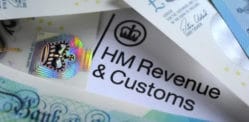"We believe our customers want to pay the right amount"
Online sellers profiting from the sale of used items or homeowners renting out their spare rooms may find themselves subject to taxation on their supplementary income as part of the new HMRC tax rules.
Starting from January 1, 2024, the likes of eBay, Airbnb, Etsy, Amazon and Vinted are mandated to disclose seller information to HM Revenue & Customs (HMRC).
This comes as part of a crackdown, dubbed the side hustle tax.
This measure aims to enable tax authorities to identify and tackle tax evasion.
At the same time, it will also level the playing field with how traditional businesses are treated for tax purposes.
This development coincides with several tax adjustments at the beginning of 2024, including modifications to the national insurance rate paid by employees.
The earnings threshold for online side hustles is established at over £1,000 annually.
Beyond this threshold, individuals engaged in online selling are required to register as self-employed and submit a self-assessment tax return by the conclusion of the fiscal year.
While HMRC previously had the authority to request information from UK-based digital platforms, the UK has now adopted new regulations effective from the beginning of 2024 through the Organisation for Economic Cooperation and Development (OECD).
These rules enable the sharing of information with tax authorities outside the UK.
Although online platforms are mandated to report seller information directly to HMRC, this requirement will only come into effect at the end of January 2025.
The information to be reported encompasses details such as tax identification, bank account particulars and the volume and value of transactions conducted by sellers engaged in substantial trading activities.
This reporting obligation applies to various digital apps and platforms, including third-party sellers on websites, covering the sale of goods and services.
It includes transactions involving handmade or second-hand items, taxi services, food delivery, freelance work and the temporary rental of accommodation or parking spaces.
HMRC said: “Individuals who regularly sell goods or services through online marketplaces may need to declare this income.
“We believe our customers want to pay the right amount of tax, and our online guidance can help customers to do so.
“This is routine activity. Each year we send out thousands of reminder letters on various areas of tax.”
To enforce the new tax rules, HMRC is allocating £36.69 million and will employ 24 full-time staff.
In a statement, Vinted said: “We are currently finalising some tools, and we’ll be contacting eligible sellers through next year with information on the steps they need to take, and why.”
Mike Parkes, the technical director at GoSimpleTax, warned people might not realise they could inadvertently breach the trading allowance.
He said:
“Earning £1,000 in a year might seem like a large amount, but that can easily be exceeded if you earn more than £84 a month across a year.”
“Selling large items, second-hand designer clothes and accessories or even unwanted baby clothes could see this capped amount of casual income easily be met, and many won’t realise that they need to be liable for tax and income payments to HMRC if they earn above this limit set by the Government.
“Putting money aside for tax throughout the year is the best way to ensure you’ll be prepared for when it’s time to complete a Self Assessment tax return, which is due by January 31.”
The announcement has angered those who frequently sell online.
Anaya Malik tweeted: “It really is mind-blowing that the government has instructed HMRC to go after people for selling stuff online (even if it is over £1,000 a year) in a cost of living crisis when so many super rich and corporates get out of paying £millions in tax through ridiculous but legal loopholes.”
Naina Kapoor said: “My honest opinion is that people selling their old clothes (or baby clothes) on Vinted will not have kept all their original receipts to prove to HMRC a profit or loss has been made on an item.
“There’s far easier low hanging fruit for HMRC to go after.”






























































